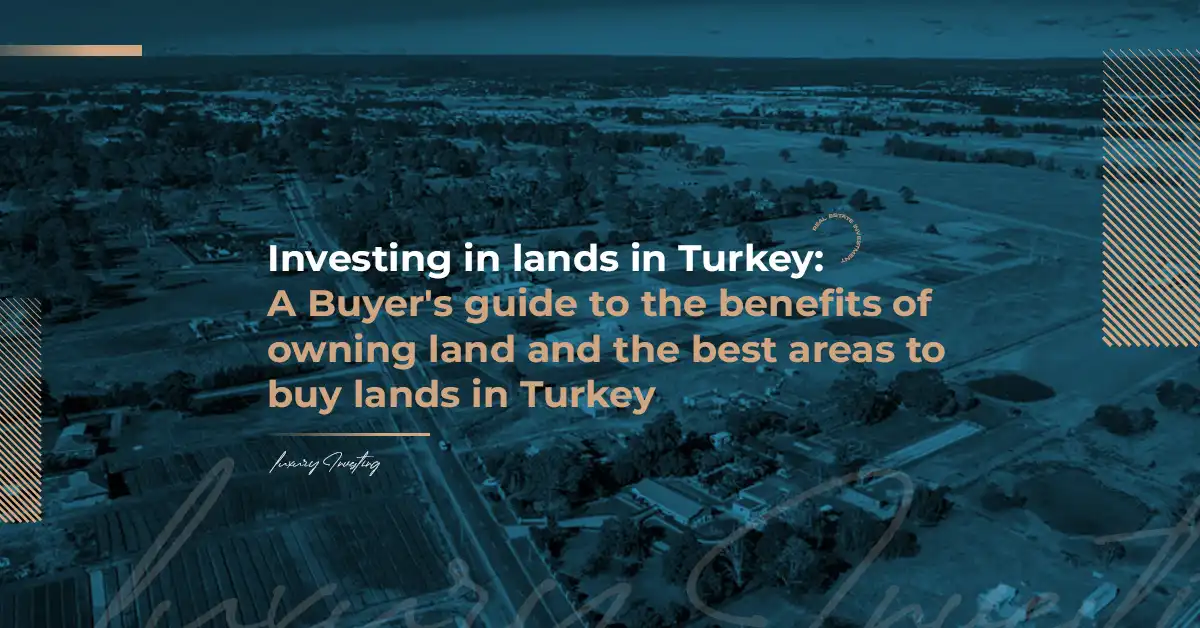
Investing in lands in Turkey: A buyer's guide to the benefits of owning land and the best areas to buy lands in Turkey
Table of Contents
Investing in land in Turkey is an attractive option for foreign investors due to the numerous advantages offered by the country, including its strategic location, continuous economic growth, and developed infrastructure. In this comprehensive guide, we will explore the benefits of owning land in Turkey, the best regions for investment, and essential tips and guidelines for buyers.
First: Benefits of owning land in Turkey:
- Continuous economic growth:
Turkey has been witnessing continuous economic growth for years, making it an attractive destination for real estate investment. Experts predict this growth to continue in the coming years, potentially leading to an increase in land value and higher returns on investment.
- Strategic location:
Turkey enjoys a unique geographical position that connects Europe and Asia, making it an important commercial and tourist hub. This strategic location enhances the attractiveness of investing in Turkish land, especially in areas of tourist or commercial significance.
- Developed infrastructure:
The Turkish government has heavily invested in developing the country's infrastructure, including transportation networks, communication systems, and public utilities. This development increases the value of the land and makes it more appealing to investors.
- Ease of ownership for foreigners:
Turkey has facilitated the process for foreigners to own real estate and land, making investment in Turkish land an accessible and straightforward option for foreign investors.
- Possibility of obtaining Turkish citizenship:
Foreign investors can obtain Turkish citizenship by making a real estate investment valued at $400.000 or more, which serves as an additional incentive for investing in land in Turkey.
Second: Best areas to buy land in Turkey:
- Istanbul:
As one of Turkey's most important economic and cultural hubs, Istanbul is a prime destination for real estate investors from around the globe. The city offers a unique diversity of investment opportunities, making it an attractive haven for various types of investors. Here, we outline the most notable areas for land investment in Istanbul:
- Beylikduzu: Located on the European side of Istanbul, Beylikduzu is known for its stunning coastal location. The area has seen rapid growth in recent years, making it a preferred destination for investors. It features high-quality modern residential projects, relatively affordable prices compared to central districts, developed infrastructure, diverse transportation options, and proximity to the new airport.
- Basaksehir: A modern and developed area in Istanbul, Basaksehir attracts investors due to its massive residential and commercial projects, numerous modern universities and hospitals, developed infrastructure, good transportation network, and high growth potential in the future.
- Buyukcekmece: Situated on the coast of the Sea of Marmara, Buyukcekmece is a promising area for real estate investment. It boasts a strategic location connecting the city center with outer regions, a mix of residential and commercial projects, scenic natural landscapes with ample green spaces, and proximity to the new airport and major transportation projects.
- Antalya:
Antalya is one of Turkey's premier tourist destinations, known for its enchanting natural beauty, stunning beaches, and mild climate. These factors have made it one of the most attractive areas for real estate investment, especially in land purchases. The best areas to buy land in Antalya include:
- Konyaalti: One of the fastest-growing areas in Antalya, Konyaalti features a strategic location along the Mediterranean coast. Investment benefits in Konyaalti include rapid growth in the real estate sector, relatively affordable prices compared to neighboring areas, developed infrastructure with modern residential projects, and high long-term growth potential.
- Lara: Known for its upscale atmosphere, beautiful beaches, and luxury hotels, Lara is a prime investment area in Antalya. Investment advantages include proximity to Antalya International Airport, numerous modern residential complexes, investment opportunities in residential and touristic land, and high demand for properties from tourists and residents.
- Kemer: Renowned for its pristine nature and clean beaches, Kemer attracts investors looking for tranquility and long-term investment potential. Investment advantages in Kemer include competitive land prices compared to other regions, the potential for significant future land value appreciation, opportunities in touristic and residential projects, and a peaceful environment suitable for upscale residential projects.
- Bursa:
Bursa, Turkey's fourth-largest city, is an attractive investment destination for many real estate investors. The city’s strategic location close to Istanbul, its natural beauty, rich historical heritage, and role as an important industrial center make it appealing. The best areas to buy land in Bursa include:
- Mudanya: One of Bursa's most prominent coastal areas, Mudanya boasts a strategic location along the Sea of Marmara. Investment advantages in Mudanya include its attractive coastal location which draws tourists and residents, proximity to Bursa's city center, ongoing infrastructure development and housing projects, and investment opportunities in residential and touristic land.
- Nilufer: A modern and rapidly developing area in Bursa, Nilufer is experiencing swift growth in the real estate sector. Investment benefits in Nilufer include diverse modern residential and commercial projects, developed infrastructure and good public services, relatively affordable prices with high growth potential, and proximity to universities and major commercial centers.
Third: Important tips and guidelines for buyers and investors
- Study the market carefully: Before investing in land in Turkey, thoroughly study the real estate market in the targeted area. Understand land prices and future growth projections.
- Consult local experts: It is advisable to hire a local lawyer and real estate expert to ensure the legal procedures are followed correctly and to avoid any potential problems.
- Verify document authenticity: Ensure the authenticity of all documents related to the land before completing the purchase, including the title deed and any building permits if applicable.
- Visit the site personally: It is important to visit the land in person to verify its location, condition, and accessibility.
- Study future development plans: Look into future development plans for the area surrounding the land, as these plans can significantly impact the future value of the land.
- Understand laws and taxes: Familiarize yourself with local laws regarding foreign ownership of land, as well as the taxes and fees imposed on property ownership and sales.
- Consider future use: Define the purpose of purchasing the land, whether for long-term investment, construction, or real estate development, and ensure the land is suitable for this purpose.
- Account for development costs: If purchasing land for construction, consider the development and construction costs in addition to the land price.
- Negotiate the price: Do not hesitate to negotiate the price of the land, especially if there are any defects or issues at the site.
- Plan for financing: Ensure you have the necessary funding for purchasing and potentially developing the land. Explore available financing options in Turkey to secure the required capital.
Conclusion:
By understanding the advantages of owning land in Turkey, selecting the right area for investment, and following the tips and guidelines mentioned in this guide, investors can achieve a successful and profitable investment in the Turkish land market. Investors should always remember that real estate investment is a long-term decision that requires patience, careful planning, and continuous monitoring of market developments. With the right strategy and appropriate guidance, investing in Turkish land can be a smart step towards building sustainable wealth and diversifying the investment portfolio.
Additional Key Points:
- Focus on emerging areas: In addition to major cities, investors can consider rapidly growing emerging areas such as:
- Sakarya: An industrial city experiencing significant infrastructure development.
- Kayseri: An important industrial and commercial hub in Central Anatolia.
- Mersin: A major Mediterranean port with great growth potential.
- Investing in agricultural land: Turkey offers excellent opportunities for investing in agricultural land, especially in regions such as:
- Antalya: Known for producing fruits and vegetables.
- Adana: One of Turkey's most important agricultural areas.
- Manisa: Famous for vineyards and olive production.
- Leverage major government projects: Investors can benefit from large government projects like Istanbul Airport, where land prices in surrounding areas can significantly increase.
- Explore industrial investment opportunities: Industrial zones in Turkey offer good land investment prospects, especially with the ongoing industrial expansion in the country.
- Investing in touristic land: Consider purchasing land in promising tourist areas such as:
- Fethiye: A renowned tourist destination on the Turkish coast.
- Cappadocia: A unique region that attracts visitors from all over the world.
- Bodrum: An upscale coastal city famous for its luxurious resorts.
- Monitor changes in investment laws: It’s important to keep track of any changes in laws and regulations related to foreign investment in Turkey, as these can impact investment opportunities and conditions.
- Utilize advisory services: Engaging with specialized investment advisory firms in Turkey is recommended, as they can provide expert advice and facilitate the purchase and investment process.
Additional points for consideration:
- Diversification in investment: Investors are advised to diversify their investments in Turkish land across different geographic areas and types of use (residential, commercial, agricultural, touristic). This diversification helps in minimizing risks and increasing profit potential.
- Investment in infrastructure: With Turkey continually developing its infrastructure, there can be good opportunities to invest in land near new infrastructure projects such as airports, ports, and transportation networks.
- Consider demographic changes: Studying demographic changes and internal migration in Turkey can help identify areas that might see increased demand for land in the future.
- Leveraging technology: Use modern technology such as mapping applications, aerial imagery, and geographic information systems (GIS) to gather accurate information about targeted lands.
- Understanding the real estate market cycle: It is important to understand the real estate market cycle in Turkey and time your purchase appropriately to benefit from periods of lower prices.
- Investment in education and health: Consider investing in land near major educational and healthcare institutions, as these areas tend to maintain their value and attractiveness.
- Environmental factors: Pay attention to environmental factors when choosing land, such as soil quality, water availability, and exposure to natural risks.
- Building a Local Network: Developing relationships with local real estate agents, developers, and other investors can help obtain valuable information and good investment opportunities.
Frequently asked questions
- Valid passport.
- Legal documents from the Ministry of Environment and Urban Planning.
- Certificate of no debts on the land.
- Agricultural.
- Residential.
- Commercial.
- Industrial.
- Good investment.
- Full ownership for foreigners.
- Safe environment.
Yes, foreigners can buy property in Turkey provided there are no security or military restrictions that exclude certain areas from foreign ownership.
Yes, foreigners can obtain bank loans to purchase property in Turkey. Loans are provided based on the terms and guarantees specified by the bank.
The property transfer process usually takes from three days to two weeks, depending on the speed of completing the procedures and the availability of the necessary documents.








